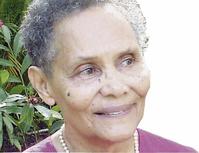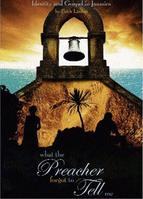Rediscovering God's masterpiece
Published: Saturday | January 31, 2009

Faith Linton
'We speak of the human predicament in terms of fall. Humanity fell. There never was a fall as tragic, a fall with consequences as serious as humanity's fall in the Garden of Eden. The seriousness of a fall depends on the height from which the fall takes place. Humanity fell from the highest place accorded any created being.'
Renowned Bible teacher Faith Linton wants Jamaican evangelists, pastors and Christians, in general, to pay more attention to the content of Genesis chapters 1 and 2. If this should happen, she believes people will discover and embrace the idea that human persons are the pinnacle of God's creation and, though damaged through the Fall, are still His masterpieces.
She sets forth her case in a newly published 96-page book titled What The Preacher Forgot To Tell Me: Identity and Gospel in Jamaica.
The book is to be officially launched on Saturday, February 7, at the 60th anniversary breakfast of the Students Christian Fellowship and Scripture Union which will be held at The Pegasus hotel, New Kingston.
Linton makes the observation that with the way Christianity has been practised in Jamaica, there has been an overemphasis on the Fall of the human family as recorded in Genesis chapter 3 and insufficient acknowledgement and appreciation of the height from which humanity fell.
God's masterpieces

Speaking to The Gleaner from her St Ann home, Mrs Linton said that museums that have art masterpieces which have been damaged will not discard those pieces of art. Rather, they will spend enormous sums to have those masterpieces restored.
She then made the link that after the human family fell as recorded in Genesis chapter 3, God still regards people as His masterpieces and has paid a high price by the giving of His son, Jesus Christ, to die for the sins of the world in order that broken and fallen humanity can be restored.
Mrs Linton made the observation that too many evangelistic sermons focus almost exclusively on Genesis chapter 3, where the ugliness of sin is evident. There needs to be greater balance in such sermons to reflect the grandeur of the human persons as bearers of the image of God, she said.
In chapter 4 of her book, she wrote, "We speak of the human predicament in terms of fall. Humanity fell. There never was a fall as tragic, a fall with consequences as serious as humanity's fall in the Garden of Eden. The seriousness of a fall depends on the height from which the fall takes place. Humanity fell from the highest place accorded any created being; that is, a flawless image of God and perfect fellowship with Him … Conviction of sin results more effectively from sin preached in the context of Genesis 1 and 2 than from preaching that begins at Genesis 3 - the story of humanity's fall. I learnt this myself from personal experience."
She decried the overuse of the 'Roman Way' (also called the Roman Road) method of doing evangelism - which begins with confronting a person with his/her state of sinfulness and rebellious state against God. While acknowledging that the Roman Road has its own validity, she stressed that often it is not the best method that should be employed.
She argues in her book that to begin evangelistic sermons and outreach with Genesis 3 will often create in persons a sense of alienation. This alienation will often manifest itself in persons lacking a sense of belonging and having an improper sense of identity, she told The Gleaner.
"Alienation is at many levels in the Caribbean. Alienation is a sense of not belonging. It is a sense that 'I don't belong'. It is a sense that I am not quite at home and I feel I don't truly qualify to be here. To correct it, we need to go back to Genesis 1."
Alienation
"It isn't the suffering that causes alienation. It is a denigration of you as a person that creates alienation. Any situation that denigrates you as a person creates alienation - class, colour, creed - but above all, anything that touches me where I am and says that I am not good enough whether it is my language, colour or negroid features."
The author, who with her husband, Ivan, are the owners and operators of The Cranbrook Flower Forest near Runaway Bay, St Ann, a 130-acre facility which boasts exotic tropical gardens, lawns, water pools and a tropical rainforest, is unhappy with popular interpretations of theological idea of Original Sin. Too many preachers, she said, believe and teach that doctrine from the point of view that humanity was fallen from the start. Thus, the doctrine is not communicated with appropriate regard for the majestic position from which the human family fell. "Original Sin is theological jargon. It is not right for me to use theological jargon with a precise theological significance as a general blanket statement. Original has very precise meaning. "You can't use 'Original Sin' to a general population and expect them to know where you are coming from … It is better to talk about the Fall than Original Sin … . The word 'fall' has the potential to counteract any misinterpretations and misunderstandings that Original Sin gives the layman. But it is not utilised.
Linton includes in her book episodes in her upbringing and how she felt and was treated like a second-class citizen in school and church. She traced it all back to authority figures in church and school failing to appreciate Genesis chapters 1 and 2; but also her own feeble grasp of that portion of the Bible.
She gives examples, too, in her own experience of teaching Genesis 1 and 2 at camps and churches and seeing persons faces shine as they grasp what God intended the human person to be.
She records the experience of sharing the message of Genesis 1 and 2 at a certain church and how it brought conviction on a particular man who resolved to change his wayward ways. The young man, the book records: "Was deeply disturbed and strongly convicted of his own attitude and treatment of women. The man declared, 'I cannot continue living the way I am living now.' Later the pastor (of the church) remarked how ready and eager the young man had been to turn his life over to the Lord Jesus. The story of the young man gives me hope. His conversion opened my eyes to the evangelistic potential of Genesis 1 and 2. It illustrates the potential of Genesis 2 to specifically address the breakdown in the relationship between men and women in our society. What astounded me was the fact that during my presentation of Genesis 2, I had made no mention of sin or sinful practices. I was not even trying to be 'evangelistic', yet that young man was strongly convicted of sin."
The image of God
The idea of the humans being the bearers of the image of God is basic to every area of Christian doctrine, Linton said.
The image of God is basic to every area of Christian teaching. The thesis of her book, she explained, is that there is an urgent need for people need to rediscover "the way God made us … . We need to see ourselves the way God sees us"
" There are parents who tell their children that 'If you do 'that', I won't love you and God won't love you'. That is terrible. That is blasphemy almost. This is because of a wrong perspective - we have begun with sin. I went to a church once and I said to the children in the congregation, what is the first thing God said about you. Their reply was 'I am a sinner.' That is so sad."
Linton stressed that salvation is God's way of restoring damaged humanity to what they were originally created to be - the masterpiece of creation. Quoting from her book, she said, "It makes a world of difference to our self-image and our understanding of the gospel to know who we really are, and where we are coming from and the purpose for which we were made."
Send feedback to mark.dawes@gleanerjm.com








